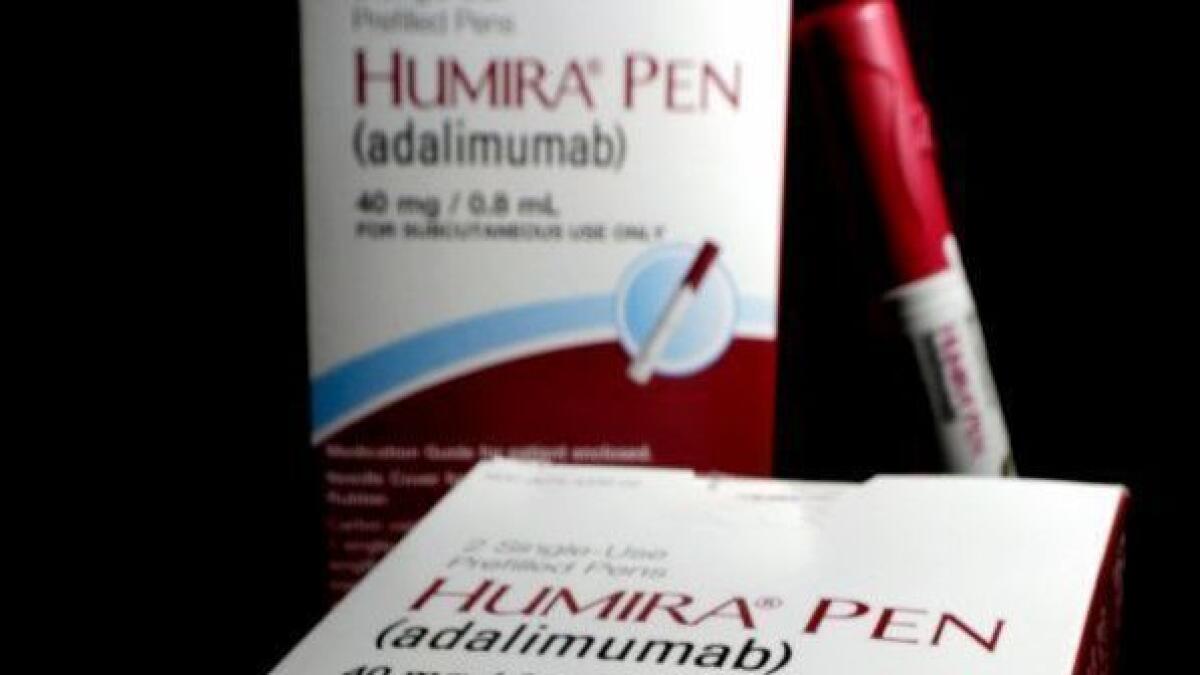California sues maker of Humira, says sales of blockbuster drug boosted through deceptive practices

California’s insurance regulator has accused pharmaceutical giant AbbVie of using kickbacks and other illegal practices to boost sales of Humira, one of the best-selling prescription drugs in the world.
Insurance Commissioner Dave Jones on Tuesday sued the company in Alameda County, alleging that the company not only wooed doctors with improper gifts but also hired nurses that gave patients misinformation about Humira and kept complaints about the blockbuster drug from getting back to physicians.
Jones said those practices suggest that California health insurers may have paid claims for Humira for patients who should not have been prescribed the drug in the first place, causing harm to patients and raising insurance premiums for all ratepayers.
Between 2013 and this year, California insurers paid at least 274,000 Humira claims worth more than $1.29 billion, according to the lawsuit, which seeks fines and penalties that could total more than $6 billion.
“AbbVie gambled with the health and safety of thousands of Californians,” Jones said. “We allege the entirety of those claims are tainted by this illegal scheme.”
Adelle Infante, a spokeswoman for the North Chicago-based drugmaker, said Jones’ allegations “are without merit” and that the company obeys applicable state and federal laws. She also defended the company’s use of nurses to work with patients.
“AbbVie provides a number of support services for patients, once they are prescribed Humira, that both educate and assist patients with their therapy, including nursing support, and these resources are beneficial to patients dealing with a chronic condition,” Infante said. “They in no way replace or interfere with interactions between patients and their healthcare providers.”
Humira is one of the top-selling drugs in the world and represents the majority of AbbVie’s business. Last year, the company sold $18.4 billion worth of the drug worldwide, accounting for 65% of AbbVie’s revenue.
In its lawsuit, the state alleges a series of what Jones’ office called “classic” kickbacks, including cash payments, drinks, meals and patient referrals offered to doctors in exchange for prescribing the drug, an anti-inflammatory medication prescribed for an array of maladies from arthritis and psoriasis to Crohn’s disease.
But the focus of the suit is on AbbVie’s employment of in-home registered nurses — “ambassadors,” the company calls them — who teach patients how to use the drug. While the nurses were represented to patients as an extension of the doctor’s office, they were trained to tout the drug while downplaying its risks, the state said.
The case is based in part on information from former AbbVie ambassador Lazaro Suarez, a Florida resident who helped train other ambassadors, according to the suit. Suarez sued AbbVie in 2015 over this issue. Jones’ office is now intervening in that case.
Suarez and other ambassadors worked for a subcontractor, Quintiles Transnational Holdings, not directly for AbbVie, according to the suit. A spokesman for Quintiles’ parent company, IQVIA, did not respond to requests for comment.
Suarez originally thought AbbVie ambassadors helped to educate patients but later “felt the focus of the ambassador program was getting and keeping patients on Humira to maintain and increase AbbVie’s profits,” according to the suit.
Suarez claims in the suit that ambassadors were trained to hide Humira’s side effects — which include increased odds of developing cancer and serious infections — and to deflect questions about side effects.
When asked about side effects, ambassadors were trained to “reply that while they were no able to discuss these side effects, they would help find a way to ‘get you your Humira for $5 or less,’” according to the suit.
Jones said the ambassador program seems to have been designed to “interfere with the communication between patient and doctor,” and that when patients complained about the drug to AbbVie-provided nurses, those complaints went to the drug company, not to doctors.
Jones alleges the ambassador program also provided doctors with valuable services, such as help with insurance claims. Those administrative services served as a financial benefit to doctors who prescribed Humira instead of another treatment and resulted in more prescriptions, according to the suit.
“If given the choice between two medications, one which comes with free nurses and administrative staff and another that requires the provider to pay professional salaries, the provider cannot but help factor the substantial nursing kickback into their prescribing calculus,” Jones alleged.
AbbVie is not the only drug company that hires nurses to work with patients. Adriane Fugh-Berman, a medical doctor and professor of pharmacology at Georgetown University, said it’s an increasingly common practice, though she’s not sure how widespread it is.
She notes that nurses are among the most trusted professionals in the country — they’ve topped Gallup’s list of most trusted for 16 years running — and that an in-home visit from a nurse can be a big selling point for any drug.
“Imagine if you had the choice between the drug that comes with Florence Nightingale or the one that doesn’t,” she said. “It’s a very potent marketing tool.”
Jones said he could not comment on other companies’ practices.
“My focus is on the facts of this case,” he said. “In this case, there are a number of ways AbbVie engaged in improper inducements.”
Shares of AbbVie closed down 2.9% to $92.61.
Follow me: @jrkoren
UPDATES:
3:55 p.m.: This article was updated with additional details and comments from AbbVie spokeswoman Adelle Infante and Georgetown University professor Dr. Adriane Fugh-Berman.
This article was originally published at 12:25 p.m.







